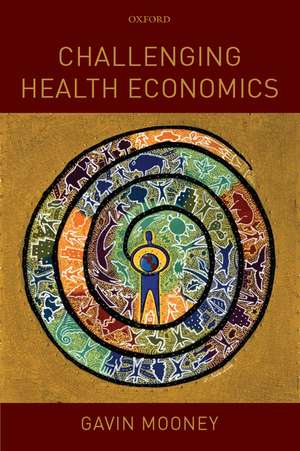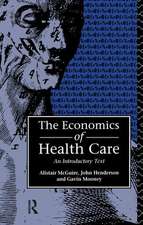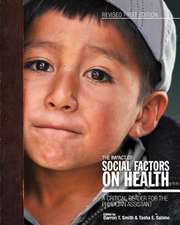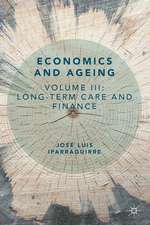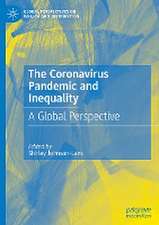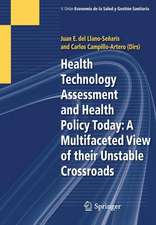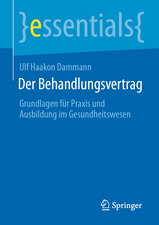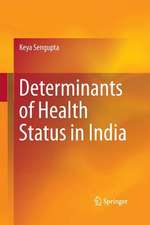Challenging Health Economics
Autor Gavin Mooneyen Limba Engleză Hardback – 22 ian 2009
Preț: 598.84 lei
Preț vechi: 858.82 lei
-30% Nou
Puncte Express: 898
Preț estimativ în valută:
114.60€ • 119.20$ • 94.61£
114.60€ • 119.20$ • 94.61£
Carte tipărită la comandă
Livrare economică 04-10 aprilie
Preluare comenzi: 021 569.72.76
Specificații
ISBN-13: 9780199235971
ISBN-10: 019923597X
Pagini: 278
Dimensiuni: 164 x 242 x 19 mm
Greutate: 0.54 kg
Editura: OUP OXFORD
Colecția OUP Oxford
Locul publicării:Oxford, United Kingdom
ISBN-10: 019923597X
Pagini: 278
Dimensiuni: 164 x 242 x 19 mm
Greutate: 0.54 kg
Editura: OUP OXFORD
Colecția OUP Oxford
Locul publicării:Oxford, United Kingdom
Recenzii
Any health economist and health policy maker wishing to make a difference in health and health care will likely benefit from reading this book. It is also a must-read for those who are committed to forming a humane health system. It is an essential text for courses in health economics, priority setting and reform of health system, as well as health policy and management. Highly recommended.
Any health economist wishing to make a meaningful contribution to health and health systems should read this book and take to heart its message of the urgent need to challenge the status quo. It is also essential reading for anyone committed to creating humane health systems, no matter what their disciplinary background. This book holds the promise of revolutionising the discipline of health economics.
This is a much needed book in the rather conservative field of health economics. Most health economists have been based in the U.S. and, for the most part, have reproduced - consciously or unconsciously - the market ideology that dominates this area of academic work in the U.S. Writing in a clear and accessible way, leading health economist Gavin Mooney dismantles the "orthodoxy" that dominates the field, challenging each of the assumptions on which the market ideology promoted in orthodox health economics is based. It is a must-read for all courses in health economics.
While others before him have poked holes in market-based theory as applied to health, Gavin Mooney is the first to provide a convincing alternative paradigm. In this book he writes convincingly and compassionately about how health economics can and should concern itself with improving the health and well-being of communities. His conclusion that a communitarian outlook can take into account the values of the citizenry in setting public priorities challenges us to formulate far more enlightened policy.
Mooneys deepest challenge is to those of us who have spent a professional lifetime struggling, like Keynes, to escape from habitual modes of thought and expression. He argues, in detail, that the traditional framework for understanding the consequences of choices among well-defined commodities by homogeneous, well-off individuals, still ramifies into every corner of our minds. There is yet far to go, to create a genuine economics of health but Mooneys book offers a direction.
Any health economist wishing to make a meaningful contribution to health and health systems should read this book and take to heart its message of the urgent need to challenge the status quo. It is also essential reading for anyone committed to creating humane health systems, no matter what their disciplinary background. This book holds the promise of revolutionising the discipline of health economics.
This is a much needed book in the rather conservative field of health economics. Most health economists have been based in the U.S. and, for the most part, have reproduced - consciously or unconsciously - the market ideology that dominates this area of academic work in the U.S. Writing in a clear and accessible way, leading health economist Gavin Mooney dismantles the "orthodoxy" that dominates the field, challenging each of the assumptions on which the market ideology promoted in orthodox health economics is based. It is a must-read for all courses in health economics.
While others before him have poked holes in market-based theory as applied to health, Gavin Mooney is the first to provide a convincing alternative paradigm. In this book he writes convincingly and compassionately about how health economics can and should concern itself with improving the health and well-being of communities. His conclusion that a communitarian outlook can take into account the values of the citizenry in setting public priorities challenges us to formulate far more enlightened policy.
Mooneys deepest challenge is to those of us who have spent a professional lifetime struggling, like Keynes, to escape from habitual modes of thought and expression. He argues, in detail, that the traditional framework for understanding the consequences of choices among well-defined commodities by homogeneous, well-off individuals, still ramifies into every corner of our minds. There is yet far to go, to create a genuine economics of health but Mooneys book offers a direction.
Notă biografică
Gavin Mooney is Professor of Health Economics at Curtin University in Perth, Australia. He is Director of the Social and Public Health Economics Research Group (SPHERe) and holds visiting positions at Aarhus University, Denmark and the University of Cape Town, South Africa.
